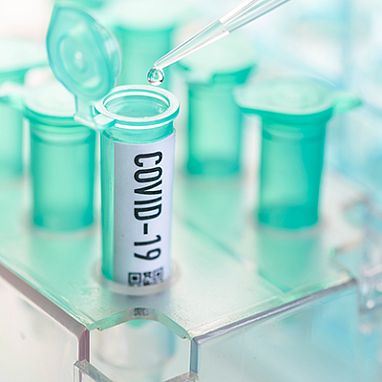
RADx-rad will support new, non-traditional approaches and reimagined uses of existing tools to address gaps in COVID-19 testing and surveillance.
Four new projects funded by the National Institutes of Health and awarded to National Institute on Deafness and Other Communication Disorders (NIDCD) grantees seek to enhance the use of smell and taste (chemosensory) testing as a COVID-19 screening tool. These projects focus on developing new tests that are cost-effective, stable, rapid, and readily scalable, allowing them to be used in any setting, including at home, at large venues, in schools, and in under-resourced communities.
Sudden loss of smell or taste is recognized as one of the hallmarks of COVID-19 by the Centers for Disease Control and Prevention (CDC). Up to 80% of patients infected with SARS-CoV-2, the virus that causes COVID-19, report a new loss of smell or taste. In fact, recent observational studies indicate that chemosensory loss is one of the most common symptoms of COVID-19 and more predictive of infection than all other symptoms, including fatigue, fever, or cough. Most studies to date have relied on patients self-reporting symptoms and highlight the need for objective chemosensory tests for COVID-19-related smell and taste loss that yield immediate results and are validated across the lifespan.
The four recently announced awards, part of the $107 million Rapid Acceleration of Diagnostics (RADx) initiative announced by the NIH in late 2020, fall under the RADx Radical (RADx-rad) program, which supports new, non-traditional, and reimagined uses of existing tools to address gaps in COVID-19 testing and surveillance. RADx-rad awards support 49 research projects and grant supplements at 43 institutions across the U.S.
“The importance of the RADx-rad initiative cannot be overstated as we seek to combat this pandemic and prepare for viral disease outbreaks in the future. NIDCD grantees are well-positioned to develop novel COVID-19 testing through their innovative research,” says NIDCD Director Debara L. Tucci, M.D., M.S., M.B.A. “I look forward to seeing the results from these awards soon in the form of safe, effective, and easy-to-administer chemosensory tests for COVID-19. I want to express my deep appreciation to Susan Sullivan, Ph.D., from the NIDCD’s Division of Scientific Programs, for her leadership to quickly engage the NIDCD in the far-reaching, high-impact RADx-rad effort. Dr. Sullivan’s expertise and commitment enabled NIDCD researchers in one of our major mission areas to access this significant funding opportunity. Their contributions will address critical questions about COVID-19-related healthcare, with the potential to help communities across the U.S.”
The NIDCD-specific awards related to the development of new tests to assess chemosensory function in symptomatic and asymptomatic individuals are:
- Ohio State University: A confectionary-based screening tool for assessing chemosensory loss in COVID-19 patients. This project will develop, validate, and deploy a test that uses hard candy to independently assess smell and taste function in individuals who are at high risk for contracting COVID-19. Project number: 3-R01DC016112-04S1.
- Monell Chemical Senses Center: SCENTinel: A rapid smell test for COVID-19 surveillance. This project will test and deploy a rapid and objective measure of smell ability, the SCENTinel test, for widespread COVID-19 surveillance. Project number: 1-U01DC019578-01.
- University of Florida: Rapid olfactory tools for telemedicine-friendly COVID-19 screening and surveillance. This project will develop and implement objective, self-administered smell tests for the purpose of identifying individuals with COVID-19 prior to, or in the absence of, viral testing, as well as for use in population-level surveillance of COVID-19 spread. Project number: 1-U01DC019573-01.
- ADK Group, LLC: Longitudinal at-home smell testing to detect infection by SARS-CoV-2. This project will develop a native app to conduct longitudinal COVID-19 smell tests; collect data on asymptomatic health care workers, symptomatic patients, and undergraduates; and develop algorithms for smell tests to potentially assess personalized thresholds, differentiate smell loss due to COVID-19 versus influenza, and assess the risk of pulmonary disease in COVID-19 infected patients. Project number: 1-U01DC019579-01.
About the Rapid Acceleration of Diagnostics (RADx) initiative: The RADx initiative was launched on April 29, 2020, to speed innovation in the development, commercialization, and implementation of technologies for COVID-19 testing. The initiative has four programs: RADx Tech, RADx Advanced Technology Platforms, RADx Underserved Populations, and RADx Radical. It leverages the existing NIH Point-of-Care Technologies Research Network. The RADx initiative partners with federal agencies, including the Office of the Assistant Secretary of Health, Department of Defense, the Biomedical Advanced Research and Development Authority, and U.S. Food and Drug Administration. Learn more about the RADx initiative and its programs.
About the National Institute on Deafness and Other Communication Disorders (NIDCD): The NIDCD supports and conducts research and research training on the normal and disordered processes of hearing, balance, taste, smell, voice, speech, and language and provides health information, based upon scientific discovery, to the public.
About the National Institutes of Health (NIH): The NIH, the nation’s medical research agency, includes 27 institutes and centers and is a component of the U.S. Department of Health and Human Services. The NIH is the primary federal agency conducting and supporting basic, clinical, and translational medical research, and is investigating the causes, treatments, and cures for both common and rare diseases.

